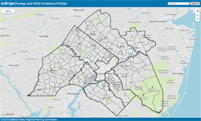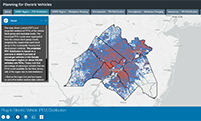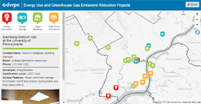DVRPC leads, supports, and coordinates efforts to reduce greenhouse gas emissions and adapt to climate change in our region. DVRPC’s long-range plan supports a goal to attain net-zero greenhouse gas emissions by the year 2050, a reduction necessary to keep the impacts of global climate change within an acceptable range. Achieving this goal relies on a combination of energy efficiency, conservation, electrification, and cleaner energy sources, as well as changes in both individual behavior and the structure of the built environment. Addressing this issue now as a region will help Greater Philadelphia's long-term economic competitiveness.
Despite efforts to mitigate greenhouse gas emissions, the climate in the DVRPC region has changed and will continue to change. The climate in Greater Philadelphia has experienced warmer and wetter weather with increases in extreme heat and heavy precipitation events. Counties, municipalities, and transportation agencies will need to plan for, respond, and adapt to these changes to insure the continued functioning of infrastructure systems, and minimize adverse impacts to the health, safety and welfare of our region’s residents, especially those most vulnerable to the impacts of extreme weather events.
Climate Change Mitigation Planning and Programs
In order to prevent the worst impacts of climate change, we must drastically cut our greenhouse gas (GHG) emissions from all sectors and transition to clean and renewable resources. Energy use accounts for the vast majority (88.2%) of greenhouse gas emissions in the DVRPC region. Energy use from commercial buildings makes up 37% of the region's total GHG emissions, and energy use from on-road vehicles and residential buildings makes up 30.6% and 20.5% of the region’s emissions respectively. To reduces emissions, DVRPC supports energy efficiency and conservation, the use of on-site and off-site renewable energy, and the electrification of buildings and vehicles in the region through implementation programs, planning, technical assistance, and data resources.
Regional Climate Action Plan
DVRPC is spearheading and coordinating the Philadelphia-Camden-Wilmington, PA-NJ-DE-MD Metropolitan Statistical Area's (Philadelphia MSA) first Climate Action Plan, a comprehensive planning process which will involve significant community engagement to prioritize actions to reduce greenhouse gas (GHG) emissions & harmful air pollution in the region. DVRPC is developing the Philadelphia MSA Climate Action Plan through its participation in the U.S. EPA Climate Pollution Reduction Grant program (CPRG).
Regional Energy Use and Greenhouse Gas Emissions Inventory
Tracking energy use, energy expenditures, and greenhouse gas (GHG) emissions is the first step in developing informed regional and local policies to increase energy efficiency and reduce GHG emissions. DVRPC developed energy use and GHG emissions inventories for Greater Philadelphia for the years 2005, 2010, and 2015. For planning purposes, energy use and GHG emissions in these inventories are allocated to the region's counties and municipalities. DVRPC's most recent inventory and map-based web tool displaying municipal allocations are for 2015.
Sustainable Energy Partnership of Southeast PA
The Sustainable Energy Partnership of Southeast PA has been working together since September 2020 to explore pathways to purchase renewable energy to power county operations in Bucks, Chester, Delaware and Montgomery counties. In October 2023, the four counties formed an Energy Board to oversee the Partnership to achieve the following shared goals: meet renewable energy targets through access to large-scale renewables with regional benefits (>10 MWs); lower energy costs and lower budget risk; grow Partnership membership; institutionalize and plan for ongoing energy procurement and establish framework for ongoing energy procurement; and avoid overextending county resources.
Regional Streetlight Procurement Program
DVRPC’s Regional Street Lighting Procurement Program (RSLPP) provides turnkey support to municipalities in southeastern Pennsylvania to convert street lights and traffic signals to LED. This program pools the decision-making and purchasing power of municipalities so that they can confidently and cost effectively complete an LED street and exterior lighting project. More than 70 municipalities have participated -converting more than 40,000 streetlights in the region to LED so far. This program is on-going.
Preparing the Region for Renewable Energy
Renewable energy sources are expected to play an increasingly important role in the future of our region's energy mix. DVRPC supports the development of renewable energy in our region. DVRPC’s Solar Landing Page highlights several resources to assist local governments and regional advocates in encouraging the growth of the local solar market and to understand and implement best management practices that help reduce the "soft costs" of solar photovoltaic (PV) installations. Many of these resources highlighted on the Solar Landing Page were developed or adopted through DVRPC’s role as a U.S. DOE SolSmart advisor. In the past, DVRPC participated in Solar Ready II, a national partnership of regions to explore best practices for encouraging local solar market growth. DVRPC's Renewable Energy Ordinance Frameworks serve as a resource for municipalities as they develop and update ordinances to govern the siting of small-scale renewable energy systems, such as solar, wind, and geothermal, in their communities.
Electric Vehicle Resource Kit for Municipalities
This resource kit is intended to help the user answer "What should my municipality do about electric vehicles?" It is written specifically for municipal managers in Pennsylvania and New Jersey, with a focus on the Greater Philadelphia region. However, the information it provides is likely to be useful to other users, including businesses, fleet managers, and potential electric vehicle owners.
Planning for Electric Vehicles – Mapping Vehicle Distribution and Workplace Charging Demand
The “Planning for Electric Vehicles - Mapping Vehicle Distribution and Workplace Charging Demand” webmap allows planners to access results from the DVRPC/UC Davis Electric Vehicle Planning Toolkit. These results include current and projected numbers and geographic distribution of Plug-in Electric Vehicles (PEVs) and the anticipated workplace charging demand associated with future distribution. The map series shows these data and projections for three different geographies: the 9-county DVRPC region, the Commonwealth of Pennsylvania, and the State of New Jersey. The EV Planning Toolkit uses different future PEV penetration scenarios to produce the data displays for each geography. The current and future PEV distribution data are viewable at the municipal and Census Block Group levels. The workplace charging demand data are viewable only at the Census Block Group level.
Municipal Energy Management
DVRPC works with municipalities in Southeastern Pennsylvania to identify ways to reduce energy use in buildings, outdoor lighting, and water/sewage treatment facilities.
Energy Use and Greenhouse Gas Emissions Reduction Projects in Greater Philadelphia
This interactive map showcases projects in the region that reduce energy use and/or greenhouse gas emissions. There are four categories of projects: Energy Innovation, Energy Storage, Green Buildings, and Solar Power Generation.
Profiles in Energy Efficiency
Throughout the region, schools, local governments, businesses, and residents are realizing considerable financial benefits by integrating energy efficiency into their operations and decision making. DVRPC's Profiles in Energy Efficiency series of case studies profile cost-effective and replicable energy-efficiency projects in the Greater Philadelphia region. These profiles not only highlight the projects in large, commercial buildings, but also include work done by homeowners, and by government municipalities in schools, libraries, and for street lights and traffic signals.
Climate Change Adaptation and Resiliency Planning and Programs
Climate change caused by global warming poses serious threats to both natural and human communities throughout Greater Philadelphia. More severe storms, increased precipitation, sea level rise, and extreme heat will likely lead to increased flooding, wetland loss, erosion, short-term drought, heat-related stress, and loss of life and property. Fortunately, adapting to climate change will not require wholesale new efforts. Existing initiatives like smart growth, floodplain management, asset management, and urban greening will make our communities more resilient to climate-related threats. DVRPC is involved in a number of planning efforts in communities throughout the region, and with national partners, to help communities consider climate change impacts in their plans, projects, and investment decisions.
Pennsylvania Coastal Resiliency
With funding from the Pennsylvania Department of Environmental Protection (PADEP), DVRPC is working with communities in the Delaware Estuary Coastal Zone (DECZ) to help build their capacity to plan for and respond to future floods, including flooding from storm surge, stormwater, and high tides.
In 2019, DVRPC created a story map of current and future flooding scenarios in Pennsylvania’s coastal zone. DVRPC developed the story map to help municipalities within the coastal zone better understand their flooding issues. As part of this work, DVRPC also developed posters tailored to each coastal municipality documenting flooding risks and providing an overview of resources, tools and policies to manage, minimize and mitigate these risks. .
Municipal Management in a Changing Climate
This 36-page brochure, published in July 2018, summarizes historic and projected changes in the region's climate, the impacts those changes are expected to have on municipal operations, and how municipalities can prepare themselves for these impacts. Figures for county-level projections may be downloaded here. This is number 31 in DVRPC’s Municipal Implementation Tool Brochure series.
Municipal Management of Extreme Heat
This 48-page brochure, published in May 2021, summarizes the causes of current and future extreme heat, the impacts of extreme heat on vulnerable populations and infrastructure, and how municipalities can mitigate, prepare for, and respond to extreme heat events. Figures, maps, and shapefiles for county-level and regional projections and analyses may be downloaded here. This is number 33 in DVRPC’s Municipal Implementation Tool Brochure series.


